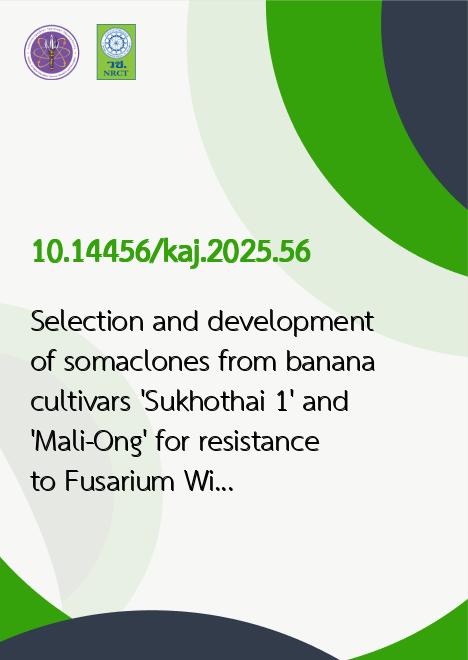
|
Selection and development of somaclones from banana cultivars 'Sukhothai 1' and 'Mali-Ong' for resistance to Fusarium Wilt (Fusarium oxysporum f. sp. cubense, Race 1) |
|---|---|
| รหัสดีโอไอ | |
| Creator | Penchan Sutthanukul |
| Title | Selection and development of somaclones from banana cultivars 'Sukhothai 1' and 'Mali-Ong' for resistance to Fusarium Wilt (Fusarium oxysporum f. sp. cubense, Race 1) |
| Contributor | Eakpol Phuvanartnarubal, Supaporn Sachart, Uthaiwan Supkaew, Tharntip Bhasabutra, Jurarat Norkaew |
| Publisher | Faculty of Agriculture |
| Publication Year | 2568 |
| Journal Title | Khon Kaen Agriculture Journal |
| Journal Vol. | 53 |
| Journal No. | 4 |
| Page no. | 814-830 |
| Keyword | Banana (Musa spp.), Banana tissue culture, Somaclonal variation, Fusarium wilt resistance |
| URL Website | https://li01.tci-thaijo.org/index.php/agkasetkaj |
| Website title | Khon Kaen Agriculture Journal |
| ISSN | 3027-6497 (Online) |
| Abstract | Banana production is severely threatened by Fusarium wilt caused by Fusarium oxysporum f. sp. cubense (Foc). This soilborne pathogen persists for over 15 years, spreading through planting materials, soil, and water, and causes substantial economic losses. This study aimed to induce somaclonal variation in 'Sukhothai 1' and 'Mali Ong' bananas and select Foc Race 1-resistant somaclones for cultivation in affected areas. The research began with the in vitro culture of shoot tips from 'Sukhothai 1' and 'Mali Ong' using MS medium supplemented with 0.2 mg/L TDZ. The explants were then subjected to fusaric acid (FA) as a selective agent across nine concentrations (0, 0.05, 0.1, 0.15, 0.2, 0.25, 0.3, 0.35, and 0.4 mM). Each treatment consisted of 30 shoot tips with three replicates, cultured for 60 days. The LD50 values for 'Sukhothai 1' and 'Mali Ong' were 1.75 mM and 1.50 mM, respectively Survival rates varied significantly depending on both cultivar and FA concentration, with higher survival observed at lower FA concentrations (0.05-0.15 mM). In contrast, elevated FA concentrations (0.35-0.4 mM) resulted in low survival rates in 'Sukhothai 1' and complete mortality in 'Mali Ong' after 60 days of culture. The surviving multiple bud clumps were transferred to MS medium for shoot multiplication and subsequent root induction, after which the plantlets were inoculated with Fusarium oxysporum f. sp. cubense Race 1 (isolate DOA2415) at a concentration of 106 conidia/mL under controlled laboratory conditions. Thirty days post-inoculation, screening revealed one somaclonal line of 'Mali Ong' exhibiting moderate resistance to Fusarium wilt and two somaclonal lines of 'Sukhothai 1' displaying resistance to Foc Race 1. Further evaluation will focus on the agronomic performance and market potential of these selected somaclones. |